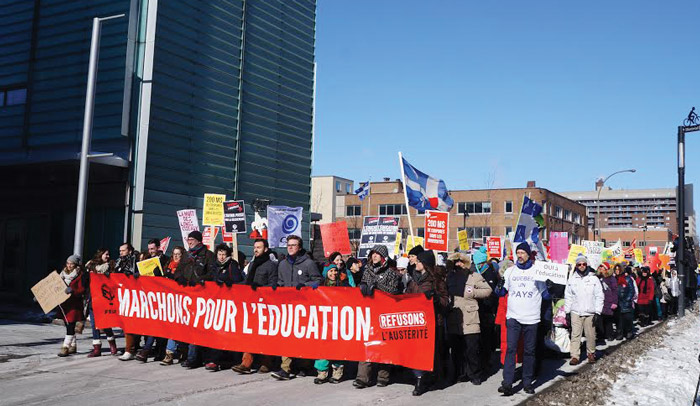Given that McGill is currently in a dire financial situation, it is surprising that the administration has not taken a firm stance against austerity. The university has projected that its accumulated deficit will rise to $96.3 million by the end of 2016. McGill’s funding problems are largely due to the reduction in funds by the provincial government, which in attempts to balance its budget, has cut millions of dollars from public spending.
McGill’s stance on austerity has been described by McGill’s Teaching Support Union (AGSEM) President Justin Irwin as one of “happy acquiescence.” While the university has not openly supported the province’s decrease in funding, it has done little to condemn it. The administration has almost taken a sympathetic tone when discussing the Quebec government’s economic woes, and has adopted a mantra of ‘grin and bear it.’ While the provincial government has promised a balanced budget, this should not come at such a high cost to social services—including education.
In the past year, thousands of students and public service workers have taken to the streets to protest the government’s reduced spending plan. Students’ Society of McGill University (SSMU) has condemned the austerity measures and even held a week to raise awareness of the issue. While student unions have traditionally discussed such issues with the government, given the current hurdles facing provincial federations, the university must take a stand in its place.
The administration could be hoping to weather this storm as quickly and as quietly as possible so as not to harm the university’s reputation. Publicizing McGill’s financial problems could deter potential students from attending the university; applicants may believe that McGill struggles to meets its students’ academic needs. Additionally, taking an openly anti-austerity position may agitate the provincial government and result in further funding cuts in coming years. Regardless, McGill’s silence comes at a great expense to current students who have to suffer through the effects of the budget cuts.
McGill used to be the highest ranked institution in Canada, which in recent years, has seen its ranking in international reports drop. Due to a lack of funds, the university has imposed a hiring freeze for administrative and support staff, postponed all non-essential equipment purchases, and stopped all non-emergency, unplanned funding allocations. Rather than creating new programs for students, the university is struggling to maintain old ones. While McGill has tried to maintain an optimistic tone in its budget proposals, and has reiterated how it remains committed to staying a competitive institution with the best professors and staff, there are clear indicators that the university is struggling to meet its commitments. For McGill to reclaim its position in the global academic field, it must take a strong stance against the provincial government’s austerity measures, and call for funding to return to pre-austerity levels.







